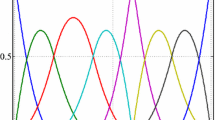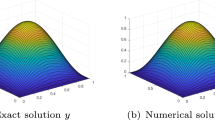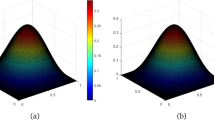Abstract
A proper orthogonal decomposition (POD) method is applied to a usual finite element (FE) formulation for parabolic equations so that it is reduced into a POD FE formulation with lower dimensions and enough high accuracy. The errors between the reduced POD FE solution and the usual FE solution are analyzed. It is shown by numerical examples that the results of numerical computations are consistent with theoretical conclusions. Moreover, it is also shown that this validates the feasibility and efficiency of POD method.
Similar content being viewed by others
References
Thomée V. Galerkin Finite Element Methods for Parabolic Problems. Berlin: Springer, 1997
Luo Z D. Mixed Finite Element Methods and Applications. Beijing: Science Press, 2006
Holmes P, Lumley J L, Berkooz G. Turbulence, Coherent Structures, Dynamical Systems and Symmetry. Cambridge: Cambridge University Press, 1996
Fukunaga K. Introduction to Statistical Recognition. New York: Academic Press, 1990
Jolliffe I T. Principal Component Analysis. New York: Springer-Verlag, 2002
Crommelin D T, Majda A J. Strategies for model reduction: comparing different optimal bases. J Atmos Sci, 61: 2306–2317 (2004)
Majda A J, Timofeyev I, Vanden-Eijnden E. Systematic strategies for stochastic mode reduction in climate. J Atmos Sci, 60: 1705–1723 (2003)
Selten F. Barophilic empirical orthogonal functions as basis functions in an atmospheric model. J Atmos Sci, 54: 2100–2114 (1997)
Lumley J L. Coherent structures in turbulence. In: Meyer R E, ed. Transition and Turbulence. New York: Academic Press, 1981
Aubry N, Holmes P, Lumley J L, et al. The dynamics of coherent structures in the wall region of a turbulent boundary layer. J Fluid Dyn, 192: 115–173 (1988)
Sirovich L. Turbulence and the dynamics of coherent structures: Part I-III. Quart Appl Math, 45(3): 561–590 (1987)
Joslin R D, Gunzburger M D, Nicolaides R A, et al. A self-contained automated methodology for optimal flow control validated for transition delay. AIAA J, 35: 816–824 (1997)
Ly H V, Tran H T. Proper orthogonal decomposition for flow calculations and optimal control in a horizontal CVD reactor. Quart Appl Math, 60: 631–656 (2002)
Moin P, Moser R D. Characteristic-eddy decomposition of turbulence in channel. J Fluid Mech, 200: 417–509 (1989)
Rajaee M, Karlsson S K F, Sirovich L. Low dimensional description of free shear flow coherent structures and their dynamical behavior. J Fluid Mech, 258: 1401–1402 (1994)
Kunisch K, Volkwein S. Galerkin proper orthogonal decomposition methods for parabolic problems. Numer Math, 90: 117–148 (2001)
Kunisch K, Volkwein S. Galerkin proper orthogonal decomposition methods for a general equation in fluid dynamics. SIAM J Numer Anal, 40(2): 492–515 (2002)
Adams R A. Sobolev Space. New York: Academic Press, 1975
Ciarlet P G. The Finite Element Method for Elliptic Problems. Amsterdam: North-Holland, 1978
Luo Z D, Chen J, Navon I M, et al. Mixed finite element formulation and error estimates based on proper orthogonal decomposition for the non-stationary Navier-Stokes equations. SIAM J Num Anal, 47(1): 1–19 (2008)
Luo Z D, Chen J, Navon I M, et al. An optimizing reduced PLSMFE formulation for non-stationary conduction-convection problems. Internat J Numer Methods Fluids, published online: DOI: 10.1002/fld.1900
Author information
Authors and Affiliations
Corresponding author
Additional information
This work was supported by National Natural Science Foundation of China (Grant Nos. 10871022, 10771065, and 60573158) and Natural Science Foundation of Hebei Province (Grant No. A2007001027)
Rights and permissions
About this article
Cite this article
Luo, Z., Chen, J., Sun, P. et al. Finite element formulation based on proper orthogonal decomposition for parabolic equations. Sci. China Ser. A-Math. 52, 585–596 (2009). https://doi.org/10.1007/s11425-008-0125-9
Received:
Accepted:
Published:
Issue Date:
DOI: https://doi.org/10.1007/s11425-008-0125-9




